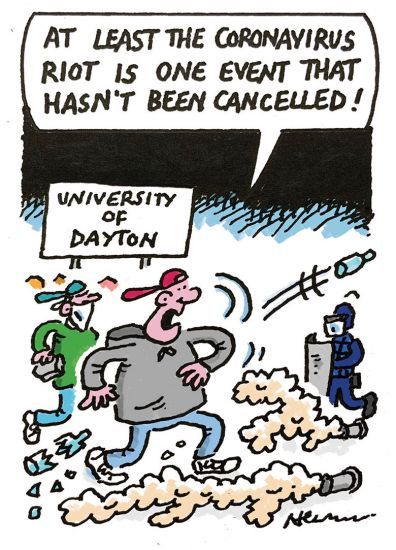
Students and staff across the world have been forced to adapt quickly to a new campus reality as universities either close completely, shut down early for the spring break or move all face-to-face teaching online as a result of the Covid-19 crisis. In most cases these sudden alterations have been met by a relatively calm and peaceful reaction. Not so at the University of Dayton in Ohio where a decision to cancel classes and close dormitories seemed to result in a near-riot, according to reports. Within hours of an announcement by the institution, 1,000 students were on the streets, the Mail Online reported, although their reasons seemed a bit muddled. Some students said they were out celebrating the cancellation of classes, but others were said to be unhappy over the sudden closure of student housing. Even so, things did appear to turn ugly at some stage, with police using “pepper balls” to try and disperse the crowd.
University leaders in the UK are still wary of tackling racism and sexism on campus because they fear institutional reputation could be damaged if it is made easier to report incidents, according to the chair of a group that is trying to address the issue. David Richardson, vice-chancellor of the University of East Anglia, acknowledged that some leaders worried that better reporting might lead to their institution being seen “by the press as a university where, for example, sexual harassment or racial harassment is rife”. But, he told a Universities UK conference on the issue, “there is much more reputational gain to be seen as a university that’s actually challenging these issues”. He said that at UEA statistics on racial and sexual harassment were spray-painted across campus to emphasise recognition of the problem, an action that had actually been celebrated on social media.
The debate about marketisation in higher education has seen a wide range of politicians and organisations take different stances, but it seems the argument against universities moving towards greater economic liberalisation now has the backing of the Church of England. A new paper – Faith in Higher Education: A Church of England Vision – argues that “wisdom…rejects economic instrumentalism. Although from the perspective of wisdom, knowledge is never without a purpose, that purpose is much broader than material prosperity. It can also serve aesthetic, environmental and political ends.” According to the Church Times, the paper, launched at the House of Lords, was put together by a group chaired by the Bishop of Winchester, the Rt Revd Tim Dakin, who is the Church’s lead bishop for further and higher education.
Universities in the UK have given more than 18,000 students almost £3 million in tuition fee refunds for lost teaching hours due to strikes in recent years, according to figures obtained by a newspaper. The Independent said that individual students received up to £4,500 in refunds due to walkouts in 2018 and 2019, although only 11 out of 66 institutions that replied to a freedom of information request said that they had made payments. It reported that, at one university, students in their final year were given Amazon vouchers instead as a “goodwill” gesture after hundreds complained. The figures may provide a guide to the compensation that could now be requested following the latest round of strikes by staff.
England’s higher education regulator has won a “landmark victory” after a court backed its decision to block a for-profit college from accessing public student loans over quality concerns. The judgment handed down in the Royal Courts of Justice backed a decision by the Office for Students to refuse registration to the Bloomsbury Institute over concerns including the provider’s high dropout rate. According to its principal, the Bloomsbury Institute had sought a judicial review because it believed the refusal “discriminates against institutions that specialise in serving students from diverse backgrounds and lower income households”, and it was “extremely disappointed” by the judgment. The decision will be a boost to the OfS, which has been facing several legal challenges from institutions refused inclusion on its register of providers. Institutions must be listed on the register for their students to access funding from the Student Loans Company.